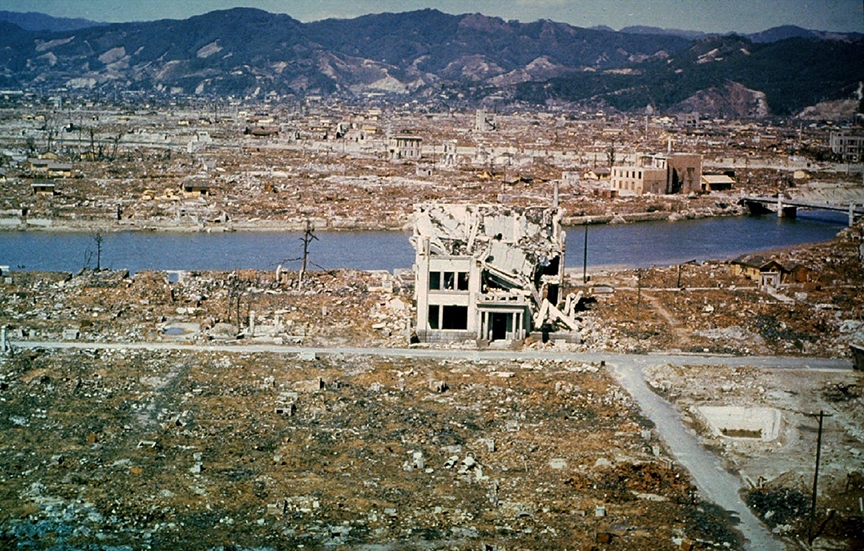
WASHINGTON. Over the course of three years, the U.S. bishops not only wrestled with the specter of nuclear Armageddon in writing a pastoral letter, but how to convey that teaching effectively.
The result was the pastoral letter “The Challenge of Peace: God’s Promise and Our Response,” which was approved overwhelmingly by the bishops in May 1983. The bishops approved the statement by a vote of 238-9.
“As Americans, citizens of the nation which was first to produce atomic weapons, which has been the only one to use them, and which today is one of the handful of nations capable of decisively influencing the course of the nuclear age, we have grave human, moral and political responsibilities to see that a ‘conscious choice’ is made to save humanity,” the document, colloquially known as the “peace pastoral,” said in its introduction.
The pastoral acknowledged how tenuous peace was with nuclear weapons ready to be fired.
“We live today, therefore, in the midst of a cosmic drama; we possess a power which should never be used, but which might be used if we do not reverse our direction,” it said. “We live with nuclear weapons knowing we cannot afford to make one serious mistake. This fact dramatizes the precariousness of our position, politically, morally and spiritually.”
Still, it was unambiguous in its treatment of nuclear weapon usage.
“Under no circumstances may nuclear weapons or other instruments of mass slaughter be used for the purpose of destroying population centers or other predominantly civilian targets,” the pastoral said. “No Christian can rightfully carry out orders or policies deliberately aimed at killing noncombatants,” it added.
Later, it proclaimed, “We do not perceive any situation in which the deliberate initiation of nuclear warfare, on however restricted a scale, can be morally justified. Non-nuclear attacks by another state must be resisted by other than nuclear means.”
Despite this, the pastoral said, “we recognize the responsibility the United States has had and continues to have in assisting allied nations in their defense against either a conventional or a nuclear attack. Especially in the European theater, the deterrence of a nuclear attack may require nuclear weapons for a time, even though their possession and deployment must be subject to rigid restrictions.”
“The Challenge of Peace” dwelt further on the concept of nuclear deterrence: “One of the criteria of the just-war tradition is a reasonable hope of success in bringing about justice and peace. We must ask whether such a reasonable hope can exist once nuclear weapons have been exchanged. The burden of proof remains on those who assert that meaningful limitation is possible.”
The bishops added, “Without making a specific moral judgment on deterrence, the (Second Vatican) Council clearly designated the elements of the arms race: the tension between ‘peace of a sort’ preserved by deterrence and ‘genuine peace’ required for a stable international life; the contradiction between what is spent for destructive capacity and what is needed for constructive development.”
The pastoral said, “This recognition – that peace is possible but never assured and that its possibility must be continually protected and preserved in the face of obstacles and attacks upon it – accounts in large measure for the complexity of Catholic teaching on warfare.”
The problem, “The Challenge of Peace” said, “is not simply one of producing highly accurate weapons that might minimize civilian casualties in any single explosion, but one of increasing the likelihood of escalation at a level where many, even ‘discriminating,’ weapons would cumulatively kill very large numbers of civilians. Those civilian deaths would occur both immediately and from the long-term effects of social and economic devastation.”
“This strictly conditioned judgment yields criteria for morally assessing the elements of deterrence strategy,” the bishops said.
“Clearly, these criteria demonstrate that we cannot approve of every weapons system, strategic doctrine or policy initiative advanced in the name of strengthening deterrence. On the contrary, these criteria require continual public scrutiny of what our government proposes to do with the deterrent.
“Nuclear deterrence should be used as a step on the way toward progressive disarmament. Each proposed addition to our strategic system or change in strategic doctrine must be assessed precisely in light of whether it will render steps toward ‘progressive disarmament’ more or less likely.”
The issue of the morality of nuclear war are “questions of life and death. True, they also have a political dimension because they are embedded in public policy. But the fact that they are also political is no excuse for denying the Church’s obligation to provide its members with the help they need in forming their consciences,” the bishops said.
“We must learn together how to make correct and responsible moral judgments. We reject, therefore, criticism of the Church’s concern with these issues on the ground that it ‘should not become involved in politics.’ We are called to move from discussion to witness and action.”
Amid all the talk about nuclear war and avoiding it, the bishops, early on in “The Challenge of Peace,” also promoted “a theology of peace (that) must include a message of hope. The vision of hope must be available to all, but one source of its content should be found in a Church at the service of peace.”
Did the pastoral have its intended effect? Well, while the “doomsday clock” is ticking closer to midnight now than ever before, more time has passed since “The Challenge of Peace” and the present day – without a nuclear incident – than had passed between the two atomic bombs that leveled Hiroshima and Nagasaki, Japan, to bring about World War II’s end and the pastoral’s issuance.









